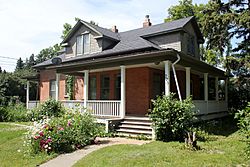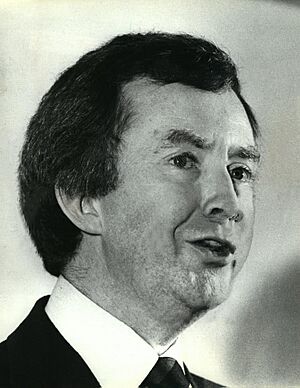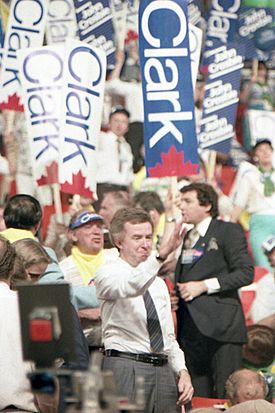Joe Clark facts for kids
Quick facts for kids
Joe Clark
|
|||||||||||||||||||||||||||||
|---|---|---|---|---|---|---|---|---|---|---|---|---|---|---|---|---|---|---|---|---|---|---|---|---|---|---|---|---|---|
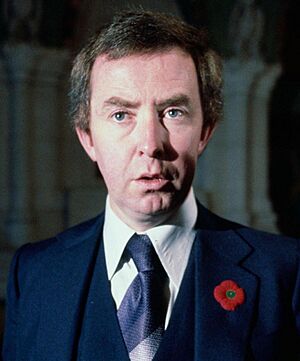
Clark in 1979
|
|||||||||||||||||||||||||||||
| 16th Prime Minister of Canada | |||||||||||||||||||||||||||||
| In office June 4, 1979 – March 3, 1980 |
|||||||||||||||||||||||||||||
| Monarch | Elizabeth II | ||||||||||||||||||||||||||||
| Governor General | Edward Schreyer | ||||||||||||||||||||||||||||
| Preceded by | Pierre Trudeau | ||||||||||||||||||||||||||||
| Succeeded by | Pierre Trudeau | ||||||||||||||||||||||||||||
| Leader of the Opposition | |||||||||||||||||||||||||||||
| In office March 4, 1980 – February 19, 1983 |
|||||||||||||||||||||||||||||
| Preceded by | Pierre Trudeau | ||||||||||||||||||||||||||||
| Succeeded by | Erik Nielsen | ||||||||||||||||||||||||||||
| In office February 22, 1976 – June 3, 1979 |
|||||||||||||||||||||||||||||
| Preceded by | Robert Stanfield | ||||||||||||||||||||||||||||
| Succeeded by | Pierre Trudeau | ||||||||||||||||||||||||||||
| Leader of the Progressive Conservative Party of Canada | |||||||||||||||||||||||||||||
| In office November 14, 1998 – May 31, 2003 |
|||||||||||||||||||||||||||||
| Preceded by | Elsie Wayne (interim) | ||||||||||||||||||||||||||||
| Succeeded by | Peter MacKay | ||||||||||||||||||||||||||||
| In office February 22, 1976 – February 19, 1983 |
|||||||||||||||||||||||||||||
| Preceded by | Robert Stanfield | ||||||||||||||||||||||||||||
| Succeeded by | Erik Nielsen (interim) | ||||||||||||||||||||||||||||
| President of the Privy Council | |||||||||||||||||||||||||||||
| In office April 21, 1991 – June 24, 1993 |
|||||||||||||||||||||||||||||
| Prime Minister | Brian Mulroney | ||||||||||||||||||||||||||||
| Preceded by | Don Mazankowski | ||||||||||||||||||||||||||||
| Succeeded by | Pierre Blais | ||||||||||||||||||||||||||||
| Minister of Justice Attorney General of Canada |
|||||||||||||||||||||||||||||
| Acting December 8, 1988 – January 29, 1989 |
|||||||||||||||||||||||||||||
| Prime Minister | Brian Mulroney | ||||||||||||||||||||||||||||
| Preceded by | Ray Hnatyshyn | ||||||||||||||||||||||||||||
| Succeeded by | Doug Lewis | ||||||||||||||||||||||||||||
| Secretary of State for External Affairs | |||||||||||||||||||||||||||||
| In office September 17, 1984 – April 20, 1991 |
|||||||||||||||||||||||||||||
| Prime Minister | Brian Mulroney | ||||||||||||||||||||||||||||
| Preceded by | Jean Chrétien | ||||||||||||||||||||||||||||
| Succeeded by | Barbara McDougall | ||||||||||||||||||||||||||||
|
|||||||||||||||||||||||||||||
| Personal details | |||||||||||||||||||||||||||||
| Born |
Charles Joseph Clark
June 5, 1939 High River, Alberta, Canada |
||||||||||||||||||||||||||||
| Political party | Independent (since 2003) | ||||||||||||||||||||||||||||
| Other political affiliations |
Progressive Conservative (before 2003) | ||||||||||||||||||||||||||||
| Spouse |
Maureen McTeer
(m. 1973) |
||||||||||||||||||||||||||||
| Children | Catherine Clark | ||||||||||||||||||||||||||||
| Alma mater | University of Alberta (BA, MA) | ||||||||||||||||||||||||||||
| Occupation |
|
||||||||||||||||||||||||||||
| Signature |  |
||||||||||||||||||||||||||||
Charles Joseph Clark (born June 5, 1939), known as Joe Clark, is a Canadian businessman, writer, and retired politician. He served as the 16th prime minister of Canada from June 1979 to March 1980.
Clark moved up quickly in politics. He was elected to the House of Commons in 1972. In 1976, he won the leadership of the Progressive Conservative Party. He became prime minister after his party defeated the Liberal government of Pierre Trudeau in the 1979 election. This ended 16 years of Liberal rule.
Taking office the day before his 40th birthday, Clark became the youngest prime minister in Canadian history. His time as prime minister was short because his government was a minority government. This means his party did not have more than half of the seats in the House of Commons. His government lost a vote on its budget in December 1979, which led to the 1980 election. Clark and his party lost to Trudeau and the Liberals, who returned to power.
Clark later served in the cabinet of Prime Minister Brian Mulroney as the minister in charge of foreign affairs from 1984 to 1991. He returned to lead the Progressive Conservatives again from 1998 to 2003. Today, Clark works as a university professor and runs his own consulting company.
Contents
Early Life and Education
Charles Joseph Clark was born on June 5, 1939, in High River, Alberta. His father, Charles A. Clark, was a local newspaper publisher.
Clark went to local schools and then to the University of Alberta. He earned a bachelor's degree in history and a master's degree in political science. As a student, he worked for his campus newspaper and became its editor-in-chief. He also worked for newspapers like the High River Times and the Edmonton Journal.
In 1973, Clark married Maureen McTeer, who was a law student. She became a well-known author and lawyer. At the time, it was unusual for a woman to keep her own last name after marriage, but she did. They have one daughter, Catherine, who works in broadcasting.
Start in Politics
Clark became interested in politics at university. He joined the Young Progressive Conservatives and eventually became their national president. During this time, he met future political rivals like Preston Manning and Brian Mulroney.
He worked as an assistant to Alberta's opposition leader, Peter Lougheed, and for the federal opposition leader, Robert Stanfield. These jobs helped him learn how Parliament worked. In 1972, he was elected to Parliament as the Member of Parliament (MP) for Rocky Mountain, a rural area in Alberta.
Clark's liberal social views sometimes clashed with more conservative members of his party. But his hard work and sharp questions in Parliament earned him respect.
Party Leader and Opposition Leader
When PC party leader Robert Stanfield resigned, Clark decided to run for the leadership in 1976. He was not the favorite to win, but he surprised many by placing third on the first vote. As other candidates dropped out, their supporters moved to Clark. He won on the fourth ballot, becoming the new leader of the Progressive Conservative Party.
At age 36, Clark was the youngest leader of a major federal party in Canadian history. His quick rise surprised many people. A newspaper headline famously asked, "Joe Who?", giving him a nickname that lasted for years.
As Leader of the Opposition, Clark worked to build his party's support. He became known for his witty remarks. One of his most famous was: "A recession is when your neighbour loses his job. A depression is when you lose your job. Recovery is when Pierre Trudeau loses his job."
The 1979 Election
By 1979, many Canadians were unhappy with the Liberal government under Prime Minister Pierre Trudeau. Clark and the Progressive Conservatives campaigned with slogans like "It's time for a change."
The Liberals attacked Clark for being young and inexperienced. But the Progressive Conservatives won 136 seats in the election. This was not enough for a majority, but it was more than any other party. They formed a minority government, ending 16 years of Liberal power.
Prime Minister (1979–1980)
On June 4, 1979, Joe Clark was sworn in as Canada's 16th prime minister. He was the youngest person to ever hold the job and the first from Western Canada.
Because he had a minority government, Clark needed support from other parties to pass laws. He decided to govern as if he had a majority, which made things difficult.
One of his government's major achievements was introducing a bill that would become the Freedom of Information Act. This law gives people the right to see government records. Although his government fell before the bill could pass, the next government used his work to create the Access to Information Act that exists today.
Internationally, Clark's government was involved in the "Canadian Caper". This was the secret rescue of six American diplomats from Iran in 1979, which was a major success.
Fall of the Government
In December 1979, Clark's government introduced its first budget. It included a new tax on gasoline to help fight inflation (rising prices). The budget was very unpopular.
On December 13, 1979, the other parties in the House of Commons voted against the budget. This is called a vote of non-confidence. When a government loses such a vote, it must resign or call an election. Clark's government fell after being in power for just under nine months.
An election was held in February 1980. Pierre Trudeau, who had planned to retire, returned to lead the Liberals. The Liberals won a majority government, and Clark's time as prime minister was over.
Return to Opposition and Cabinet
Clark became the Leader of the Opposition again. But some members of his party felt he could not win another election. In 1983, he called for a leadership convention to settle the question of his leadership.
At the convention, Clark lost to Brian Mulroney. He agreed to serve under Mulroney, and when the Progressive Conservatives won the 1984 election, Clark became a powerful member of the new government.
As Secretary of State for External Affairs, Clark was respected around the world. He took a strong stand against apartheid (a system of racial segregation) in South Africa. He also helped lead the Western world's response to a terrible famine in Ethiopia.
Later, he became the minister responsible for trying to solve issues around Quebec's place in Canada. He retired from politics in 1993.
Second Leadership and Final Years in Politics
In 1998, the Progressive Conservative Party asked Clark to return as leader. He agreed and won a seat in Parliament in 2000. He led the party through the 2000 election, where they won just enough seats to remain an official party.
Clark worked to rebuild the party. He argued that Canada needed a political party that was in the centre, between the Liberals and the more conservative Canadian Alliance.
In 2003, the Progressive Conservative party and the Canadian Alliance decided to merge and form the new Conservative Party of Canada. Clark was against this merger. He felt the new party was too conservative. When the parties merged, he chose not to join and sat as an Independent Progressive Conservative until he retired from politics in 2004.
Life After Politics
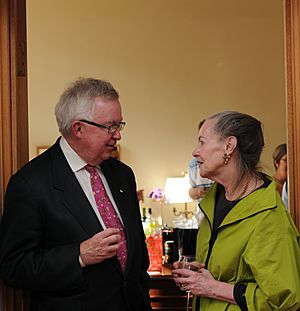
Since leaving politics, Joe Clark has worked as a professor at universities like McGill University and American University. He teaches about politics and international development.
He is also part of the Global Leadership Foundation, an organization of former world leaders who help current leaders with challenges like promoting democracy and peace. He has also worked with former U.S. President Jimmy Carter to observe elections in other countries.
In 2020, Prime Minister Justin Trudeau appointed Clark as a special envoy to help Canada's campaign for a seat on the United Nations Security Council.
Honours
As a former prime minister, Clark is called "The Right Honourable" for life. He is a Companion of the Order of Canada, the country's highest civilian honour. He has also received the Alberta Order of Excellence. An elementary school in his hometown of High River, Alberta, is named École Joe Clark School in his honour.
See also
 In Spanish: Joe Clark para niños
In Spanish: Joe Clark para niños
- List of prime ministers of Canada
 | Jewel Prestage |
 | Ella Baker |
 | Fannie Lou Hamer |


